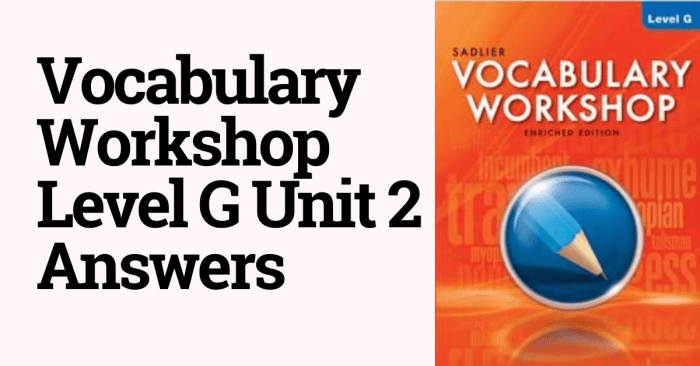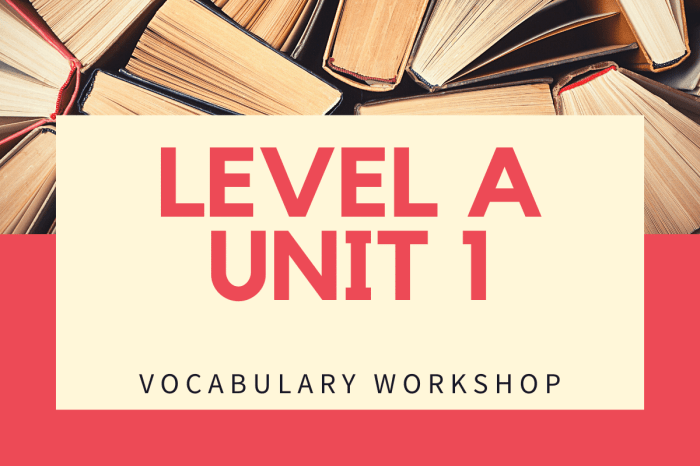Welcome to the realm of vocabulary, where words ignite the power of expression! Dive into the depths of Vocab Workshop Unit 2 Answers, where we unravel the secrets of expanding your linguistic prowess. Embark on an engaging journey as we explore the intricacies of word analysis, contextual understanding, and real-world applications.
Unit 2 delves into the art of vocabulary building, equipping you with effective strategies to enrich your vocabulary. We’ll uncover the significance of word analysis and morphology in vocabulary development, providing practical examples to illuminate these concepts. Discover the role of context in unlocking the true meaning of words and phrases.
Overview of Vocab Workshop Unit 2

Unit 2 of the Vocab Workshop delves into the fascinating realm of etymology, exploring the captivating origins and histories of words.
Through engaging exercises and activities, you will uncover the hidden stories behind common words, delving into their linguistic roots and tracing their evolution over time.
Exercises and Activities
The unit encompasses a wide range of interactive exercises and activities designed to reinforce your understanding of etymology:
- Word Origins Exploration:Discover the etymological roots of various words, tracing their origins back to ancient languages and cultures.
- Etymology Quizzes:Test your knowledge of word origins with interactive quizzes that challenge your understanding of linguistic history.
- Word Family Analysis:Examine the relationships between words within a word family, identifying common roots and tracing their semantic evolution.
- Historical Context Exploration:Investigate the historical contexts that shaped the development of words, understanding how social, cultural, and technological factors influenced their meanings.
Vocabulary Building Strategies

Unit 2 introduces several effective techniques for expanding vocabulary. These strategies empower learners to acquire new words and enhance their understanding of language.
Contextual Analysis
Contextual analysis involves inferring the meaning of unfamiliar words from the surrounding text. Learners are encouraged to pay attention to context clues, such as synonyms, antonyms, definitions, or examples, to deduce the word’s significance.
Exercise:Read a passage containing unfamiliar words and try to determine their meanings based on the context. Highlight or note down these words and their inferred meanings.
Root Word Analysis
Root word analysis involves identifying the root word or morpheme of an unfamiliar word. By understanding the core meaning of the root, learners can deduce the meaning of related words, such as prefixes, suffixes, and derivatives.
Exercise:Identify the root words of a list of unfamiliar words and explore their meanings. Create a table or diagram showing the root word, its meaning, and related words.
Etymology
Etymology delves into the historical origin and evolution of words. By tracing the etymology of words, learners gain insights into their original meanings, usage, and cultural influences.
Exercise:Research the etymology of a set of unfamiliar words using a dictionary or online resources. Present your findings in a brief report or presentation, explaining the historical origins and semantic shifts of the words.
Word Analysis and Morphology
Word analysis and morphology play a crucial role in vocabulary development. Word analysis involves breaking down words into their constituent parts, such as prefixes, suffixes, and root words. Morphology is the study of word formation and structure, including how words are formed and how they relate to each other.
Understanding word analysis and morphology enables learners to decipher unfamiliar words and expand their vocabulary. By recognizing common prefixes and suffixes, learners can infer the meaning of new words they encounter. For instance, the prefix “un-” often denotes negation, as in “unhappy” or “unfair.”
Similarly, the suffix “-tion” typically indicates a process or state, as in “education” or “conversation.”
Unit 2 Activities
Unit 2 of the Vocabulary Workshop incorporates various activities to teach word analysis and morphology. These activities include:
- Identifying prefixes, suffixes, and root words in given words
- Using word analysis to determine the meaning of unfamiliar words
- Creating new words by adding prefixes or suffixes to root words
- Exploring the relationships between words with similar prefixes or suffixes
Contextual Understanding and Usage
Context is crucial for understanding and using new vocabulary. It provides clues about the meaning of words and helps learners connect them to their prior knowledge.
Activities that focus on contextual understanding include:
Cloze Activities
Cloze activities involve filling in missing words in a text. This helps learners infer the meaning of unknown words from the surrounding context.
Contextual Definitions
In contextual definitions, learners are given a word and a sentence that uses it. They must then provide a definition based on the sentence.
Word Mapping
Word mapping involves creating a visual representation of a word’s meaning by connecting it to related words and concepts. This helps learners build a deeper understanding of the word.
Vocabulary in Action: Vocab Workshop Unit 2 Answers
Unit 2 of Vocab Workshop is dedicated to equipping students with practical strategies for applying new vocabulary in real-world situations. Through engaging writing and speaking exercises, students are encouraged to incorporate these words into their everyday communication, fostering a deeper understanding and retention of the acquired vocabulary.
Writing Exercises
Students are presented with writing assignments that require them to employ their newly learned words in coherent sentences and paragraphs. These exercises focus on various writing styles, including descriptive, narrative, and persuasive writing, providing students with opportunities to practice using the words in different contexts and for specific purposes.
Speaking Exercises
In addition to writing exercises, Unit 2 also emphasizes oral practice. Students engage in discussions, debates, and presentations, where they are expected to articulate their thoughts and ideas using the target vocabulary. These speaking exercises not only reinforce the students’ understanding of the words but also enhance their confidence in using them in real-world conversations.
Assessment and Feedback

Assessment in Unit 2 plays a crucial role in monitoring students’ vocabulary progress. Various methods are employed to gauge their understanding and application of new words.
Once you’ve mastered the vocab workshop unit 2 answers, you’ll be ready to take on the unit 3 comprehension test asl . The test covers a variety of topics, so make sure you’re prepared before you start. After completing the unit 3 comprehension test asl, you can return to practicing vocab workshop unit 2 answers to further solidify your understanding of the material.
One primary assessment tool is regular quizzes. These quizzes test students’ recall of word meanings, synonyms, antonyms, and usage in context. Quizzes provide immediate feedback on areas where students need additional support.
Feedback and Support
Feedback is an integral part of the assessment process. Teachers provide specific and timely feedback on students’ performance. This feedback includes:
- Corrections of incorrect answers
- Explanation of correct word meanings and usage
- Identification of areas for improvement
- Encouragement and praise for progress
Through ongoing feedback, students can identify their strengths and weaknesses, allowing them to focus their learning efforts effectively.
Additional Resources and Activities
Enhancing your vocabulary is an ongoing journey. Here are some additional resources and activities to supplement Unit 2 content and support your continuous vocabulary development:
Online Resources
- Vocabulary.com:An interactive website with quizzes, games, and word lists to build vocabulary.
- Merriam-Webster’s Word of the Day:Receive a daily email with a new word, its definition, and usage examples.
- Quizlet:Create and share flashcards and play games to practice vocabulary.
Offline Activities, Vocab workshop unit 2 answers
- Read widely:Explore various genres of literature, news articles, and non-fiction books to encounter new words in context.
- Keep a vocabulary notebook:Jot down new words you encounter, along with their definitions and examples.
- Engage in word games:Play crossword puzzles, Scrabble, or other word-based games to challenge your vocabulary.
Tips for Continuous Development
Beyond Unit 2, continue to expand your vocabulary through the following strategies:
- Set realistic goals:Aim to learn a few new words each day or week.
- Practice regularly:Dedicate time to reviewing and using new words in writing and speaking.
- Seek feedback:Ask others to provide feedback on your vocabulary usage to identify areas for improvement.
User Queries
What is the significance of word analysis in vocabulary development?
Word analysis involves breaking down words into their constituent parts, such as prefixes, suffixes, and roots. This process helps you understand the meaning and origin of words, making it easier to remember and use them effectively.
How does Unit 2 help students apply new vocabulary in real-world situations?
Unit 2 includes exercises and activities that encourage students to use new vocabulary in writing and speaking tasks. These exercises provide opportunities to practice using new words in context and develop confidence in their usage.
What are some additional resources or activities that can supplement Unit 2 content?
Consider using online vocabulary games, reading books or articles on topics of interest, or engaging in conversations with native speakers to further enhance your vocabulary development.